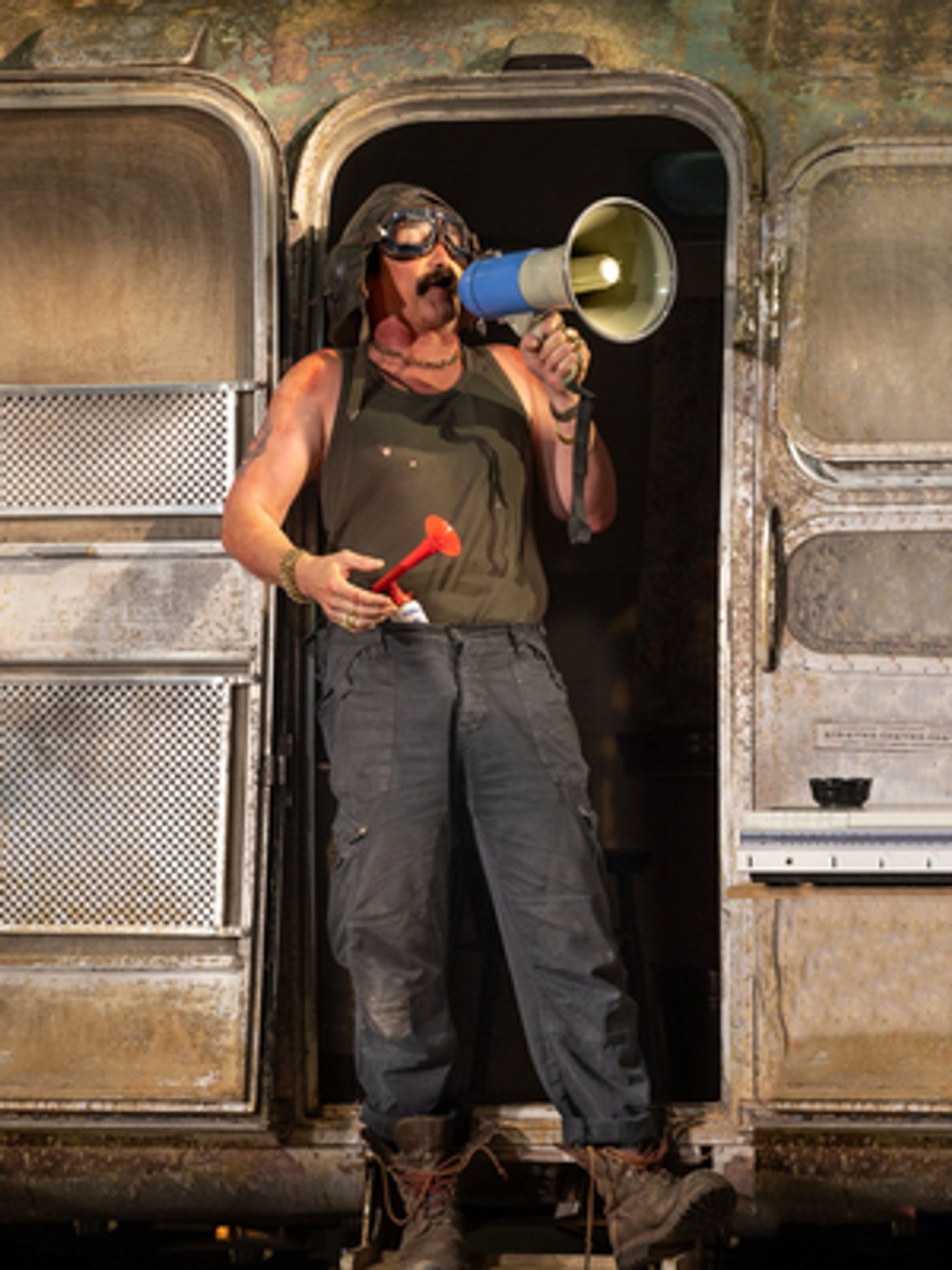Review: JERUSALEM, Apollo Theatre
A landmark play and a landmark performance delivers anew 13 years on

 Jerusalem has an extraordinary first 20 minutes: the song; the rave; the Rylance - except it's not really its first 20 minutes is it? Because it's impossible not to sit in the stalls, look at the distressed Cross of St George that forms the curtain, and consider the play's mythos: the iconic posters re-appearing around London ten or so years on; the 'Best Play Of The Century' accolade; the Brexit. It's not just high expectations one is fighting (as one does waiting for Hamilton or My Fair Lady or Uncle Vanya) it's the feeling that this play, this iconic event, will comfort us in a turbulent world. It will explain England to us English.
Jerusalem has an extraordinary first 20 minutes: the song; the rave; the Rylance - except it's not really its first 20 minutes is it? Because it's impossible not to sit in the stalls, look at the distressed Cross of St George that forms the curtain, and consider the play's mythos: the iconic posters re-appearing around London ten or so years on; the 'Best Play Of The Century' accolade; the Brexit. It's not just high expectations one is fighting (as one does waiting for Hamilton or My Fair Lady or Uncle Vanya) it's the feeling that this play, this iconic event, will comfort us in a turbulent world. It will explain England to us English.
Johnny "Rooster" Byron lives in a caravan in the woods in Wiltshire. He lays claim to the land through a garbled version of adverse possession, the assertion that his Byron blood is so intermingled with the soil that they are one and the same. Of course, he's also asserting, literally and metaphorically, the right to live beyond the law, this Englishman's Castle the venue for drug-dealing, loud music and underage sex (aka rape), a non-stop transgressive carnival of excess. The residents of the new estate, barely 400 yards down the hill, don't like it, but neither do plenty of others in the village with whom Rooster has feuded for decades. The chickens, as Chaucer remarked, are coming home to roost.
An extraordinary tsunami of theatricality broaches the fourth wall to sweep us into the story. ULTZ's set is full of living things, as if Rooster's life-force has powers to animate what should be inanimate, authenticise the inauthentic. Eggshells are flung into the house. The shit on show is the shittiest shit I've seen on stage.
And there's Rylance, the Rooster's chest pushed out, the defiance and decadence turned up to 11. The Carnival King commands his court of hangers-on and wannabes with stories of his exploits - not true (probably), but who cares, he's a cult leader building a legend and mythology of his own here and there's little utility in the truth if that's your objective. It is an extraordinary performance, the charisma carrying a control of speech and space that justifies the often overused phrase "career-defining". You cannot see Rylance in the same light again - Rooster will not be blinked away.
For all the splendid work director, Ian Rickson, demands elsewhere on stage, Rylance's Rooster's sheer star wattage makes it hard to discern much in the way of fully realised supporting characters, particularly the female roles, which are barely developed at all.
Mackenzie Crook is back as Ginger, his clinging on to a showbiz role (DJing) all the more poignant now he looks uncannily like Iggy Pop. Jack Riddiford and Ed Kear form an amusing double act as Lee, the boy escaping to Australia and Davey, the boy who shudders if he sees a sign saying "Welcome to Berkshire". Eleanor Worthington-Cox is an ethereal Phaedra, the May Queen who may, or may not, bring down a curse that finally does for Rooster's roistering.
The third act takes a sharp turn (to the Right in my view, but, like all serious art, other interpretations are available) Jez Butterworth largely abandoning the raucous comedy, pyrotechnic language and bloody good fun of the first couple of hours. Rooster is now in a suit and lamenting what he knows will be his fate, first at the hands of Barry Sloane's hulking thug, Troy out for revenge and secondly when a paramilitary, Wacoesque assault is brought by the South Wiltshire police.
Things get a little Shakespearean, and the theme of England's identity, hitherto only occasionally breaking through the supercharged narrative, gets a proper examination, As it does, one cannot help but see its weaponising in Brexit, the event that will define England for a century, that stands almost exactly halfway between the play's first staging and this revival. I kept hearing blood and soil too, English Romanticism snuggling up to its more seductive and more dangerous German version - "Blut und Boden" indeed.
Maybe that's the true power of the play - the insistence that we examine our own vision of England afresh. But your reviewer grew up with the same kind of disdain for Tolkienesque mumbo-jumbo, Arthurian legends and the anchor that soil offers, that Rooster's motley crew show to the Morris dancing Wesley. I grew up a stone's throw from the very edge of England, where Antony Gormley's iron men stare out towards Another Place, the sand sucking them downwards towards Hell, their intention not to squat and stay (as was Rooster's) but to quit and never look back.
Jerusalem is at the Apollo Theatre until 7 August
Photo Simon Annand
Reader Reviews
Videos

